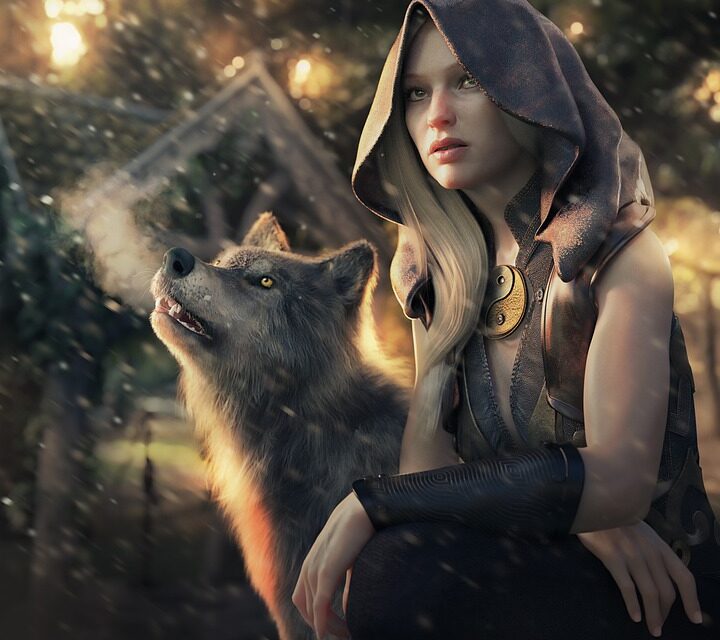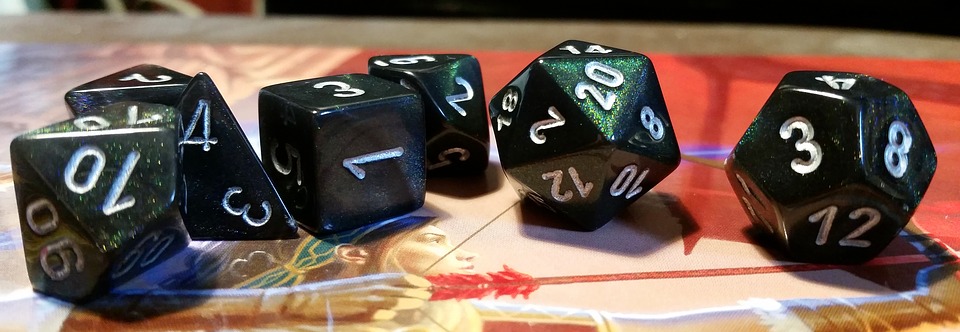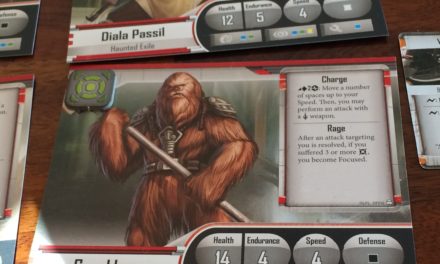Ever wonder: Why don’t women show up to my gaming table?
“Why don’t women ever want to join my Dungeons & Dragons game? I see all these girls playing on streams and I just don’t think they’re real.”
Dudes ask me this question a lot.
“I’m totally open to anyone playing my games. Why wouldn’t someone different than me want to come and sit at my table full of men who hit on girls? I have tons of ladies who are friends and they think I’m great. Why wouldn’t someone game with me? Damn, I’d love an exotic girlfriend who games.”
I hear this a lot, too. And because I’m white, I also get asked a lot if I could procure a [insert nationality or ethnicity here] girlfriend.
Women who game aren’t items you buy on eBay. We are fucking people, and these questions are obvious indications that you haven’t exactly thought that through.
“My girlfriend is great, but she won’t play. She only plays [ESO, story games, Facebook games, Switch games] and not real games like D&D.”
Uh, those are real games. And the companies that make them can make some good money on them, because they’re pretty popular. Maybe ask Nintendo. Maybe try playing literally any other game than the one you’re obsessed with making her conform to.
Here’s what it comes down to…
Fuck You. Pay Me.
First of all, I’m a professional consultant in this area, so don’t expect I’m going to hand over hours of my time to explain basic manners to you for free. But, if you’re willing to pay (or read this free blog post), I’m happy to help. One time, a dude approached me at a Starbucks station after I’d been on a panel about women in gaming.
He expected I had an hour to sit there and chat (uh, no, I was scheduled to run a game) and didn’t even really ask to engage. And then after we did start talking, he was looking for advice on marketing his game to women. Without paying me for my 20 years of expertise in marketing, search engine optimization, and game design. Or even offering to buy a $5 latte. Come on, dude.
I’m not saying this to complain; I’m pointing it out because it happens all the time.
Women and Girls: Not the Same (Usually)
Check out the first quote. Maybe you’re treating women and girls like they are the same. A girl is an underage woman. A woman is an adult who was a girl (if they are a cisgender woman).
When a cisgender man uses this term interchangeably, it’s a red flag. He may as well be saying he’s not going to take me seriously, he’s going to infantilize me, or I’m only invited because I’m supposed to bring coffee or beer to the table.
(There are exceptions to every rule–some trans girls who are 18 or older like being called girls because they were girls, but were constantly misgendered, figuring it all out in a cis-default world, and/or dealing with some safety issues that prevented them from coming out. When they ask you to call them girls, you call them girls.) Generally, though, when cis men use women and girls as interchangeable terms, often punctuated with “ladies,” it means they haven’t really thought it through and any woman who wants them to think differently is in for hours of unpaid labor, possibly with no result.
(Not sure what words like transgender and cisgender mean? No worries as long as you’re willing to learn. Planned Parenthood has you covered.)
Women Who Game Are Everywhere
Women are all over the internet, gaming stores, and conventions playing board games, tabletop games, live action role playing games, and more. We’ve made some inroads. We’ve built our own tables. Sometimes we got laughed at, but we kept doing the thing and sitting at each other’s tables until they became fixtures. You can no longer claim that a woman gamer, or a woman geek, is some kind of mystical unicorn.
It’s not cute and it’s not true.
We are pretty much everywhere and we are more visible than ever.
Back in 2015, I leveraged statistics about the buying and attendance power of women to get a press pass to New York Comic Con. I found that at the time, nearly half of all attendees were women or girls! And that was years ago.
There’s also the usual disclaimer: This reflects my experiences, but likely reflects the experiences of some (but not all) people with the same or different marginalizations than me. Not all “othering” is the same, and due to my own privileges, I do not experience all of it. But some of these offenses are frequent and obvious. I am not speaking for people whose marginalizations are different than mine, but I am providing examples of people with different marginalizations than me so you might consider whether you are excluding someone based on, for example, race or sexuality. These examples are not exhaustive, especially for those who have different marginalizations than I do.
If you’ve asked those opening questions before–it’s on you to read the rant. You needed to.
But now I’m gonna help you.
6 Reasons Why Women Don’t Show Up to Your Gaming Table
If you’re going to make an honest effort, I’ll give you some things to look out for. This is not an exhaustive list, and it’s only the obvious things I have observed, and things that have directly impacted me multiple times. These are also things I tend to see established game masters and dungeon masters overlook.
The good news? These bad habits have some easy fixes. See if you can spot these problems in the future, and attempt to mitigate them.
Problem: Literally No Room
We’ve all been there. This holds especially true for larpers (live action role players)—or for that matter, anyone who has ever been late to a party. You show up, everyone’s standing in a circle, seated around a table filling every chair, or already engaged in conversation, and it’s hard to find a way in.
If you already feel a little weird, thanks to being the only person who looks like you in the room, for example, this can just make you feel worse.
How can you avoid being an exclusionary jerk here?
Solution: Make Room
If you see someone new head your way, give an acknowledgement, like a nod. Even if you’re otherwise engaged in conversation, this acknowledgment is helpful. If you’re standing in a circle or sitting around a table, open up space or make sure there’s enough chairs. If appropriate, extend an invitation to join. You need to make sure the other guys at the table buy in, too. “Hey, can you move over?”
Ask for space and your invitation might get accepted. Voila: new player, possible new friend. It’s a win-win.
Problem: You’re Not Listening
When someone new tells you they’d like to be involved, believe them. They’ll often ask how to be involved, or tell you how they’d like to be included if possible. “Do you have room for another player?” is a common way to ask for an invitation, especially if you’re someone who has been excluded in the past.
However, sometimes it’s hard to actually ask to be involved. For someone not included in the default group, it feels like violating a social boundary and fishing for an invitation to ask. The fear of rejection is also pretty real. When you don’t follow up with an invite, it reinforces their notion that they’re just not included.
If they ask to do something that just doesn’t work for the game, try “no, but…” and provide them with another useful thing that they can do to feel included. This is especially important for rules-heavy games. Always find a way to help someone new participate. If it’s a mechanical hang up, ask them about what goal they are trying to have their character complete and then offer some alternate choices or paths.
If they present an idea that works, make sure to employ a “yes, and…” strategy–which is generally just great advice for any game runner, leader, or facilitator.
Chances are, the other players will be excited about that idea, too, and it’s up to the new person to take agency and decide.
Solution: Listen Actively
Instead of just nodding or liking their Facebook status about it, try some active listening methods. Repeat their desire to provide a sense of being heard. Make sure to follow up and then actually extend an invite rather than assume someone you might have previously excluded takes the initiative to join on their own.
When they ask to be involved, ask them how and provide them with some ideas. “Our group could really use a paladin or maybe a bard. Are either of those character classes you might want to play?”
Problem: No Invitation, No Inclusion
Here’s something lots of established community runners don’t get: inviting and including are two different things. You need both, especially when you’re hoping to include a marginalized member of your community.
Solution: Invite and Include
First, you need to actually extend an invitation; then, when the invitation is accepted, you have to include. Sounds like a lot of work? Yeah, it is: but it’s worth it. Your community will be stronger with a variety of voices in it.
Despite a lot of experience and being included more times than I’m excluded, I often still need the invitation and the inclusion if everyone at the table looks different than me.
Problem: The Girlfriend / The Unicorn Treatment
Dating someone already established in the gaming world, especially if they’re an entrenchingly accepted guy? You’re the eternal plus one. Or…if you’re like me, maybe you’re the gaming expert (or also one) and you get treated like a plus one even though you have more cred than anyone at the table. It’s the worst. And while I shouldn’t have to parade my list of accomplishments just to get respect, I often has to, and it has to be repeated by the boyfriend, too, or the other guys aren’t going to hear it.
Solution: Don’t Assume
Sure, people can be in relationships, but they’re also individuals with their own interests and credibility. Whether they’ve been gaming for decades or this is their first adventure, you can only make the community better by welcoming them. Avoid patronizing behavior, like assuming they don’t know anything. I’ve had lots of guys try to mansplain larp to me (I’m a larp designer) – even by using my own blog posts. Maybe…check the byline before you commit this fatal error, or better yet, be helpful without being patronizing.
And don’t forget: not every woman wants to date you. She might not even be into your gender. She might be monogamous or maybe she’s poly-saturated.
Problem: Seems Like Shyness
Like lots of nerds, I’ve been called socially awkward. But wait…I run live action games online. I’ve sung in front of thousands of people at once. I panel at conventions. I’m a marketer. I’m the person sometimes tasked with helping others feel welcome or comfortable at larps. How on earth do I come off as socially awkward?
Oh right. It’s that feeling when you walk in a room. And you’re the only [whatever] in the room, where ‘whatever’ is obvious—the only woman, person of color, person using an assistive device, young person, old person—and no one starts the conversation. You’re the person who everyone treats as invisible in the board room (if you even get there), but suddenly become awkwardly visible in a room full of people when you’re the only other.
And then you’re the only person getting more face time with their phone instead of other people.
And then you don’t bother showing up.
So let’s get this straight: I’m walking into a community of people who may or may not accept me, and based on past experience, it could really go either way. In the past, I’ve been told to leave. I’ve had my ass grabbed while shopping for dice in the middle of a busy con (looking at you, Gen Con). I’ve been stared at, glared at, and treated rather differently when it’s suddenly apparent that I’m attending as press or as a guest.
I’m not shy, and I’m not socially awkward. I get labeled that way by men who want to maintain some sort of weird upper hand in their hierarchy of nerd-dom. It’s pretty fucked up when forcing labels like “socially awkward” in a casual gaming situation sounds no different than what an abuser might say repeatedly in a toxic relationship. Gross. Plus, if you’re pointing out someone’s awkwardness or shyness, it’s also possible that they are neurodivergent, and it’s really not kind or helpful to highlight this.
Solution: Have a Kind Conversation
Do you see someone new to the community acting reticent? There’s probably more going on there, and they could use a new, non-creepy friend. You don’t have to spend your entire event with the new person, but you could be friendly and have a welcoming conversation. As someone super affected by this problem, trust me: it makes a difference.
Problem: Inclusive Lip Service, No Delivery
Posting an article about inclusion in your Facebook group does not make you inclusive.
Manufacturing and promoting an inclusive and sensible line of products and integrating it into your lore does not make your brand suddenly inclusive.
Being part of communities that do that does not make you inclusive. (Let me tell you how often someone tries to mansplain to me why [insert random dudebro game here] is suddenly inclusive. Uh, no. You don’t get to define that. If I walk up to your table, feel weird, and my first thought is ‘wow, I’m glad my friend of color didn’t have to endure this bullshit,’ then you’re not trying hard enough.)
Solution: Active Inclusion
What are you doing to actively include new people in your community, especially if they come from backgrounds not reflected in your current gaming group? This is going to be the toughest solution yet, and it’s definitely not one that any person gets right 100 percent of the time (I certainly don’t). However, it’s probably one of the most important things you can do to move in the right direction.
Start by thinking about who you ask to play, and why everyone in your gaming group already looks the same. Then do some Googling and read some reddits about why people NOT like you feel excluded in your communities. That way, you’re not asking women to do all this labor for you–you’re reading what they have already written and taking it into consideration.
Bonus Solution: Identify Their Needs and Fill Them Before Making an Ask
With a bit of research (and possibly some money, if you’re able to hire a paid consultant), you can employ basic inbound marketing strategies to get anyone you want at your table. It’s a bit like Field of Dreams: If you build it, they will come — you just have to make sure they know about it, and that can take a lot of reputation-building.
It All Started with Wargaming…
I started writing this post years ago. I was dating someone who worked in wargaming and I sat down at gaming tables with lots of men who thought it was strange that women didn’t enjoy the same games. After just an hour with one such group, I pointed some things out:
- The stools were not comfortable or accessible for my 5’1″ height, or my invisible disability, and the table was too high to accommodate lower chairs.
- The store had so many tables, it was impossible to sit or stand around our table without being bumped or having my purse shoved around or touched by some rando dude.
- I was sandwiched next to two men I’d never met before after being verbally assaulted by a man on the street just hours prior.
- They didn’t use my name, and referred to me as “[Man’s name]’s girlfriend” when an RPG book I contributed to as an editor was sitting on the shelf behind them.
- They didn’t listen when I stated my preferences. I wanted to play the UK team in their WWII flight battle game because I like Spitfires and don’t like playing Nazis. Three games in, I still hadn’t touched a Spitfire model. So the very thing that especially held my interest in the game… no one even let me explore.
- They said racist things and assumed I was okay with it because I am white. In fact, it made me uncomfortable, and in my experience, white cis men who are racist are often unkind to trans and cis women of any race or age.
- They assumed I wasn’t interested in games about the military. In fact, my full-time job is in the defense industry and I’m fascinated by naval history. If they’d asked, they might have learned what I’m not interested in is reenacting systems of oppression in a context that doesn’t allow for exploration or discussion.
- They couldn’t understand why I didn’t like some armies in the wargames, or some of the fantasy games they played like Warhammer 40k or Lord of the Rings, when it was as simple as: “most of the armies are men only, even in a fantasy environment, and that’s not necessary or even historically accurate in many instances.”
- Since they weren’t trying to impress me because I was “taken” by another man at the table, they did not practice basic hygiene. I was more interested in hanging out with the 13 year olds playing Magic: the Gathering because they had mastered the art of using deodorant and they were interested in both learning and teaching how to play.
They could have avoided most of these pitfalls by… well, just by being better people. But if they’d wanted me to play? They could have learned a lot about me by having a five minute conversation about what I do for a living, what other types of games I like to play, or even caring about my favorite historical airplane instead of assuming I don’t know what the planes are even called.
While things have changed in the general landscape over the past few years, these are still points worth making.
If this has helped you, or if you consider this piece to be of value, please consider buying me the cup of coffee that the random dudebro never did! Thanks!










![‘The Prince’ Educational RPG: What Would Machiavelli Do? [Free PDF Download]](https://geekinitiative.com/wp-content/uploads/2015/02/machiavelli-florence.jpeg)